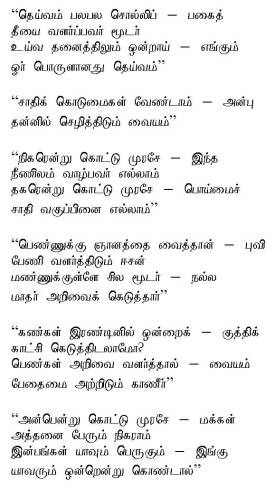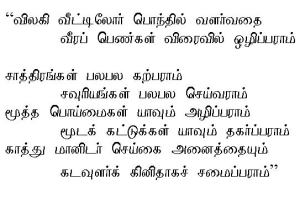“May the Transcendent Light illumine your hearts, homes and communities, and may all your celebrations deepen the sense of belonging to one another in your families and neighborhoods, and so further harmony and happiness, peace and prosperity.” Thus did the Pope bless the people of India when they celebrated “Deepavali” a short time ago, on 23rd October, 2014.
What a great thing to say! And, this, we heard from the great spiritual leader of Christianity!
The world has changed a great deal since Bharati’s times. And yet, in these hundred or more years, the world has not quite changed. While certain positive changes have occurred due to globalization, some negative consequences have also come into existence, bringing challenges to the situation of the world. In fact, the “old” problems – in spite of the persistent efforts of great religious leaders and social reformers – have been accentuated, and have taken on various forms on an enormous scale, wreaking havoc and causing disharmony.
At this time, it is necessary that these crucial social themes and messages be restated, so that the goal of a just and peaceful society can be achieved. Globalization has not achieved what should be its primary objective – that of uniting people – it has, rather, acted negatively, to induce widespread “materialism” and “consumerism” which in turn, have had a negative impact on humanity. As a result, “self-absorption,” the hunger for power, and, in general, an “indifferent” attitude towards other human beings have developed in societies around the world. What the great Catholic leader has said is absolutely true: this “indifference makes us slowly inured to the suffering of others and closed in on ourselves.”
Pope Francis created a new “theme” for the Deepavali day, and he called it, “a culture of inclusion.” “Inclusion” – meaning, to include others in your circle – other races, religions, nationalities, classes, and people of different economic and educational levels – not to exclude or alienate them. Creating a culture of inclusion in the global environment is a grand scheme, and the idea holds great importance.
On the other hand, the hoped-for results might or might not happen. Why not? There is dissatisfaction, greed, hatred, jealousy, and inequality – there are religious, caste, class, racial, and other differences – in the world, in almost all sectors of societies, leading to violence and cruelty all over the world.
The problems are severe, and have already started affecting the roots of social structures; perhaps, there is clearly much more to do. A fundamental change of attitude among people everywhere will have to occur. Somebody will have to take charge of cleansing the debris, building new paths, and re-establishing our cherished values – the values that lead us towards these desired goals.
Early in the 8th century, Adi Shankaracharya organized Hinduism to include six religions which believed in the principles established by the Vedas. The disparities between these religions were eliminated and a clear goal was achieved. This was, perhaps, an essential step in the history of Hinduism, in order to establish and further develop a peaceful social environment. Shankara’s philosophy was Advaita – that, all beings are one and the same, and in unity with God – therefore, they are all equal. For Hinduism, Advaita was a leading light. It set everything right in the human mind, and clarified all doubts concerning existence and the existence of God.
Bharati was a firm believer in Advaita philosophy. All his poetry was based on this principle. The culmination of this philosophical approach is the realization of oneself. As Bharati writes, “I am God”.
Bharati “included” all men and women of the world within one circle: on a global level – the patriots of India who suffered ill-treatment under the British rule, the women who drudged in the cane fields of Fiji, the Russians who suffered the cruelty of the Czar, the Belgians who confronted the consequences of World War I; he talked about supporting the freedom of women in China, he joined with Mazzini, the Italian patriot, in his vow to fulfil “the Order of God” in his country – in general, he was in fellowship with the human beings who suffered “exclusion,” poverty, and sickness.
His “inclusion” further extended to birds and inanimate objects:
“The Crow and the Sparrow are of our caste
The Sea and the Mountain are of our crowd
Whichever way we look, there is none other than ourselves
Looking again and again, oh dance of joy!”
— Poetry: Philosophy– “Jaya Berigai”
“ ‘I exist in all lives’, said Kanna peruman (Krishna).” On the basis of this Truth,
“All belong to one Class, one Race. We are all people of India, the Kings (rulers) of this country,” said Bharati to the Indians who were then enslaved under British rule. He declared, “if one person goes without food, we will destroy the whole world”.
— Poetry – Nationalism: “Bharata Samudayam”
Bharati, while fighting for India’s freedom from British rule, simultaneously worked towards eradicating social problems such as religious and caste differences, superstitions, inequality between men and women, ignorance, and poverty.
Bharati’s Drum (Murasu) beats loud to celebrate success when the negative elements of Indian society were destroyed:
— Poetry – Nationalism: “Murasu”
“They are fools who cultivate the flames of enmity
Insisting on the existence of several Gods
God is One, Which exists in all beings.”
“There should be no cruelties of caste . . .
The world will flourish only by love.”
“God blessed woman with wisdom
A few fools on earth destroyed their intellect.”
Bharati’s main theme was to free women who suffered inequality at the hands of men. In his times, women had no access to education, no freedom of speech or movement; they lived in darkness in a corner of the house, they followed and adhered to the qualities of “fear” (acham) and “shame” (naanam), which “foolish” men established as virtues for women.
– Poetry – Nationalism: “Pudumai Penn”
Bharati’s “New Woman” (Pudumai Penn) declared that women would learn many new sciences (sastras); they would destroy all of the old rules and foolish ties that controlled them; they would travel all over the world and bring all that is new of their learning to India, and work to make their country great.
Let the Murasu beat, “all are equal” . . . “all are one.”
Let the Murasu beat “destroy all Classes” . . .
Let the Murasu beat “Love” . . .
— Poetry – Nationalism: “Murasu”
“Let there be Light!” – said God.
“Tatsa vitur varenyam” – chanted the Veda mantra (Gayatri)
“Let us discern the Light of the Deva of red rays (The Sun)
Let him illuminate and guide our intellect”
— Translation in Tamil by Bharati of the Gayatri mantra
(Panchali Sabatham: Canto 1, poem 153)
“May the Transcendent Light illumine your hearts .. .” said the spiritual leader of Christianity.
— Poetry – Philosophy: “Agni Sthomam”
“Agni, grows towards the sky to see Usha, the Dawn of wisdom.”
— Bharati: The poetry of the Vedic Rishis: interpretation of Agni







Leave a comment